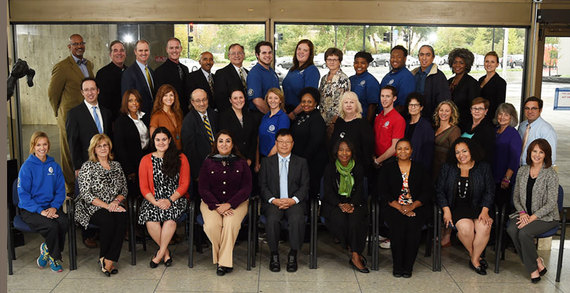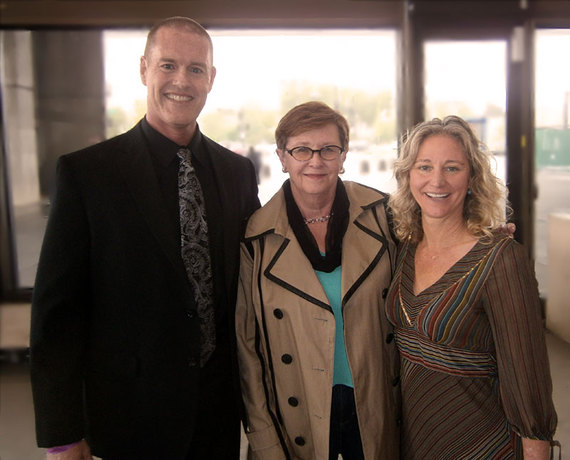As a divorced bisexual man now remarried, I am -- to borrow the words of writing guru Robert McKee -- a "recovering Catholic."
Don't get me wrong: I've always had respect for other people's faith, regardless of their religion. Well before I had an opinion on the matter, I was baptized in the name of the sixth century Irish hermit -- Kevin. By the time I'd received first communion and was confirmed, I had a hat-trick of saints' names in total. Sunday mass was an obligation, not an option. And to this day, my mother, a devout believer, still drops what she's doing to say rosaries for loved ones and people in need.
Thanks to my parents' sacrifices, I had the good fortune to study under Jesuits in high school. And again later, I ran into their unique brand of education while earning my Master's degree at Boston College. Ironically, those men of faith taught me how to think critically and examine my world objectively -- effectively giving me the tools to question everything I was taught and inspiring me to choose my own path in life. Over time, I found my personal beliefs moving away from some of those the Catholic Church taught, especially when it came to matters surrounding sexual orientation and gender identification. As a result, the people I turned to for support when I was outed were mostly those of the bisexual community, not any faith-based congregation.
So I was taken by surprise when a few days after attending the 2015 White House Bisexual Community Policy Briefing, I received an invitation from Kimberly Konkel, Associate Director for Health at the Department of Health and Human Services, to the second annual meeting of "Building Resilient Communities Through Trauma-Informed Congregations."
At the White House, Kimberly and I had spoken briefly about my backstory and the work I'm doing to heal stigma. Still, I had to check with her when I saw the invite. Kimberly assured me that since the stigma surrounding many traumas is often what keeps people from seeking help, my input would be appreciated.
A week later, I found myself sitting in the rooftop conference room of the Hubert H. Humphrey building in Washington D.C., along with approximately 50 other attendees.
As the only invited bi+ leader, this experience was markedly different from my last visit to our nation's capital, when I'd been part of a large group of like-minded individuals with similar motivations for attending. This time, as far as I could tell, the majority of the attendees were religious leaders of various faiths. Other than Kimberly, I didn't see a single familiar face. To say that I felt out of place would be an understatement.
The meeting kicked off with attendees saying a few words about themselves and their communities. The first half-dozen people to speak were pastors, priests, ministers and other religious leaders representing a variety of congregations.
Group photo, Building Resilient Communities Through Trauma-Informed Congregations, 2nd Annual Meeting. Image courtesy of the U.S. Department of Health and Human Services.
I listened to one after another speak sincerely about helping those most vulnerable. And instead of feeling more out of place, I came to understand why Kimberly had invited exactly this mix of people to this discussion. Due precisely to our diversity, each of us was a trusted leader in our respective communities. And because of that trust, we were all first responders to trauma.
When my turn came, I proudly introduced myself as a board member of the Bisexual Resource Center and member of the Bisexual Leadership Roundtable. I shared the sad truth that things don't necessarily get better for bisexuals as they grow older, since they suffer higher rates of suicide and attempted suicide than their heterosexual, gay and lesbian peers. Finally, I stated my reason for attending the meeting: "I'm here to save lives."
As I looked around the room, I could tell that my words had greatly touched others. I'd voiced what I suspect the overwhelming majority had on their minds. Every life we lose to violence, intolerance, addiction or suicide is one too many, no matter what god that person worshipped; no matter the color of his or her skin; no matter his or her sexual orientation or gender.
As it turned out, I wasn't the only non-religious leader there. I had the pleasure of meeting Mark Charles of 5 Small Loaves, a Native American leader advocating for racial reconciliation, as well as Tim Kelly of the Survivors of Torture Program at the Office of Refugee Resettlement, HHS. I was also pleased to meet Rainbow Youth Alliance founder Stephanie Kreps, who spoke eloquently of the ongoing necessity of providing safe spaces and support for our LGBTQ youth.
Kevin Hogan, Stephanie Kreps and Kimberly Konkel. Image copyright: Kevin Hogan.
What I learned in those few short hours was incredibly important: across our nation, communities and congregations are in dire need of successful strategies to combat poverty, addiction, abuse, violence, sex trafficking, mental health issues and toxic stress, to name but a few. The stigma that surrounds each of these matters is oftentimes a hurdle in getting the individuals who need it the help they deserve.
Logically, if leaders aren't trained to recognize and treat trauma, their own community members won't receive appropriate support. Instead of healing, they could very likely become retraumatized. By establishing a team consisting of diverse community leaders, Associate Director of Health Kimberly Konkel has effectively created an interfaith, cross-cultural network aimed at sharing information and developing best practices for recognizing and treating trauma and its associated problems in a humane, respectful and holistic manner.
At the end of the day, I was struck by an important realization: empathy that extends to all communities is the most important factor in creating a trauma-informed society. And that's why, in the year ahead, I'm honored to collaborate with all of the leaders I met that day, religious or not, to create resilient, trauma-informed communities that work together to better serve those who need it most.


